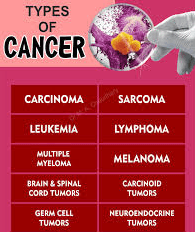Types of Cancer with their Causes, symptoms and Treatment
Cancer, a formidable adversary in the realm of human health, is a complex and multifaceted group of diseases characterized by the uncontrolled division and growth of abnormal cells. The journey into the understanding of cancer encompasses its introduction, causes, various types, and the ever-evolving landscape of cancer treatment.
Introduction of Cancer
Cancer, in its myriad forms, arises when the intricate mechanisms that regulate cell growth and division go awry. Normal cells follow a meticulously orchestrated process of growth, division, and death. However, when genetic mutations occur, they can disrupt this delicate balance, leading to uncontrollable cell proliferation. These abnormal cells can form masses or tumors, interfering with the body’s regular functions.
Causes of Cancer
 Unraveling the causes of cancer involves navigating through a labyrinth of factors. Genetic mutations, often inherited or acquired during one’s lifetime, play a pivotal role. Environmental influences, such as exposure to carcinogens like tobacco smoke, ultraviolet radiation, and certain chemicals, contribute significantly. Lifestyle choices, including diet, physical activity, and exposure to infections, also weave into the intricate tapestry of cancer causation.
Unraveling the causes of cancer involves navigating through a labyrinth of factors. Genetic mutations, often inherited or acquired during one’s lifetime, play a pivotal role. Environmental influences, such as exposure to carcinogens like tobacco smoke, ultraviolet radiation, and certain chemicals, contribute significantly. Lifestyle choices, including diet, physical activity, and exposure to infections, also weave into the intricate tapestry of cancer causation.
Types of Cancer
Cancer manifests in various forms, each with its distinct characteristics and behaviors. Carcinomas, arising from epithelial cells, are the most common and include breast, lung, prostate, and colorectal cancers. Sarcomas originate in connective tissues like bones and muscles, while leukemia emerges in blood-forming tissues. Lymphomas affect the immune system, and central nervous system cancers involve the brain and spinal cord. The diversity of cancer types reflects the complexity of the disease and demands tailored approaches for diagnosis and treatment.
Treatment of Cancer
The battlefield against cancer has witnessed remarkable advancements in treatment modalities. Surgery, a time-honored method, involves the removal of tumors. Radiation therapy employs targeted doses of radiation to eliminate cancer cells or shrink tumors. Chemotherapy utilizes drugs to impede the rapid division of cancer cells, while immunotherapy harnesses the body’s immune system to combat the disease. Targeted therapy and hormone therapy focus on specific molecular aspects of cancer cells, aiming for precision in treatment.
Conclusion
In conclusion, the saga of cancer unfolds with a profound exploration of its introduction, causes, types, and treatment strategies. The collaborative efforts of researchers, and healthcare professionals, and the resilience of individuals facing this formidable foe continue to shape the narrative of progress in the fight against cancer.
Emerging Frontiers in Cancer Research
As scientific understanding deepens, cutting-edge research unveils new frontiers in the battle against cancer. Genomic studies have illuminated the intricate interplay of genes in cancer development, paving the way for personalized medicine. The exploration of cancer stem cells offers insights into the roots of malignancy and potential therapeutic targets. Moreover, the burgeoning field of liquid biopsy holds promise for non-invasive cancer detection through the analysis of circulating tumor DNA.
The Role of Lifestyle and Prevention
While unraveling the complexities of cancer, emphasis on preventive strategies gains significance. Adopting a healthy lifestyle, including a balanced diet, regular exercise, and avoidance of tobacco, emerges as a formidable shield against certain cancers. Screening programs for early detection play a pivotal role, enabling timely intervention and improved outcomes. The synergy of prevention, early detection, and advancements in treatment paints a more optimistic horizon in the fight against cancer.
Global Impact and Societal Perspectives
Cancer’s impact extends beyond individual health, permeating societal, economic, and global dimensions. The socioeconomic burden of cancer underscores the importance of accessible healthcare and research investment. Addressing disparities in cancer outcomes among diverse populations becomes paramount, necessitating a holistic and inclusive approach. International collaboration in research and resource allocation contributes to a unified front against a disease that transcends borders.
Psychosocial Aspects and Supportive Care
The cancer journey encompasses not only physical battles but also profound psychosocial challenges. The emotional toll on individuals facing cancer and their loved ones necessitates comprehensive supportive care. Psychosocial interventions, including counseling, support groups, and integrative therapies, play a crucial role in enhancing the quality of life during and after cancer treatment. Recognizing the holistic needs of individuals navigating cancer reinforces the compassionate fabric of cancer care.
In essence, the ever-evolving narrative of cancer weaves a tapestry of scientific progress, preventive endeavors, global collaboration, and compassionate care. The collective efforts of researchers, healthcare providers, policymakers, and the resilient spirit of those affected by cancer form the mosaic of hope in the pursuit of a world where cancer is not just treatable but preventable and ultimately conquered.